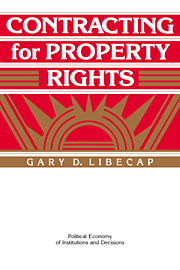Book contents
4 - Contracting for changes in federal land policies
Published online by Cambridge University Press: 24 March 2010
Summary
INTRODUCTION
Mining camp agreements to assign private mineral rights on federal lands in the midnineteenth century were completed quickly and later, incorporated routinely into state and federal laws, particularly into the federal Mining Law of 1872. Similar efforts made toward the end of the nineteenth century to gain formal recognition of local property rights arrangements to federal range land and to modify the law to allow for the sale of federal timber land, however, were much less successful. Indeed, in many cases the federal government opposed the division of the land practiced and advocated by ranchers and timber companies. Their demands never were incorporated formally into federal land law in the manner afforded the private mineral claims made under mining camp rules. This chapter examines the history of efforts to change federal policy regarding range and timber lands to facilitate private claiming. It outlines the reasons those changes were not made and identifies some of the costs of failing to establish procedures for defining clear property rights to land.
The objectives of ranchers and timber companies were to adjust federal land transfer policies to allow for patents or titles to larger private claims of timber and range land than the 160 acres commonly allowed under the land laws and to relax the requirement for agricultural development as a condition for receiving title. The lands in question were timber lands, largely in the Pacific Northwest, and arid range lands west of the 100th meridian, running from North Dakota to Texas.
- Type
- Chapter
- Information
- Contracting for Property Rights , pp. 51 - 72Publisher: Cambridge University PressPrint publication year: 1990



